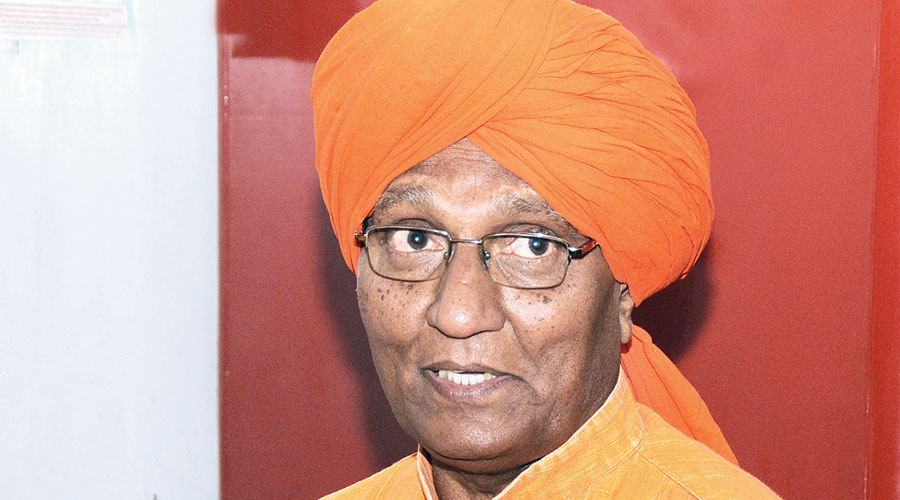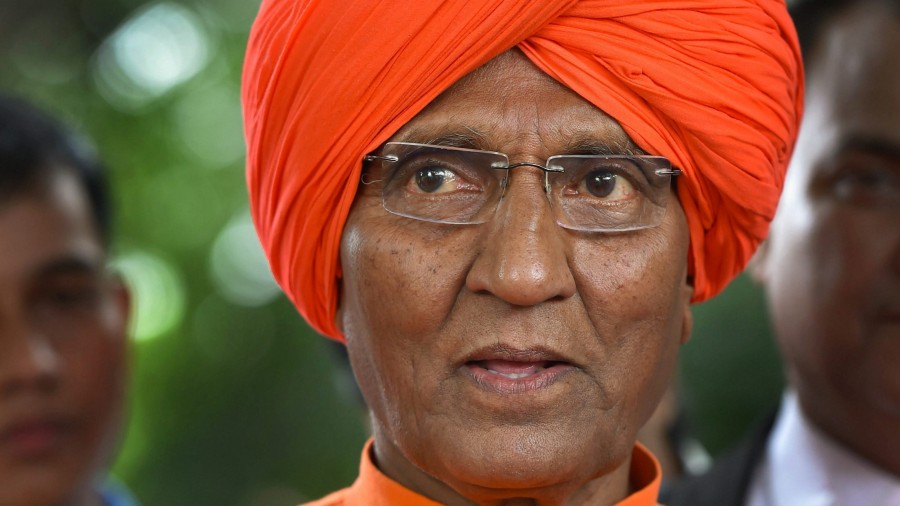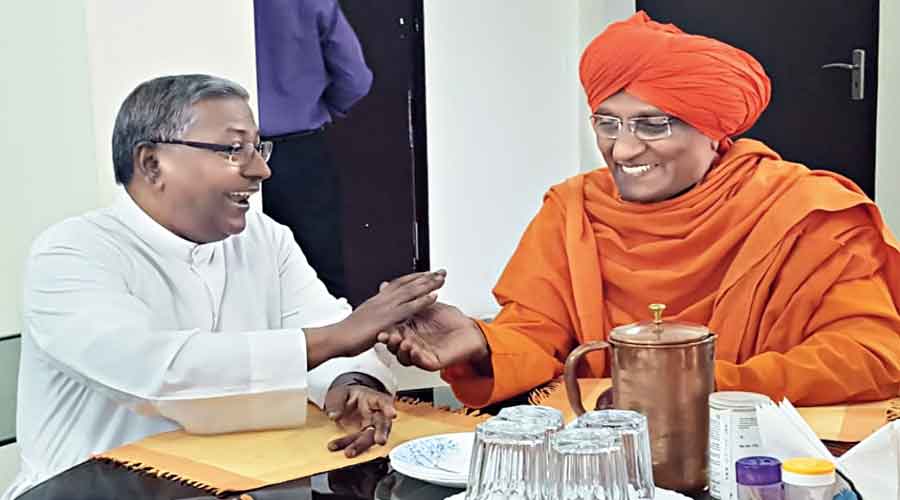The last time I heard from Swami Agnivesh was a week ago. He was in hospital, sinking. In the few moments of lucidity he had gained, he had his assistant connect him to me.
“I had a great vision early this morning,” he said. I was eager to know.
I had been in continual contact with him ever since he had been admitted to the ILBS Hospital in New Delhi two months ago. Deep inside me, the process of disconnecting from this great soul had begun by the time he had called me this time; a pattern I had experienced with every person I loved on the eve of his or her death.
He was eager to tell me....
“I saw 140 million people standing together, united,” he struggled to say, his voice rising and falling in cadences of eagerness and breathlessness. “They were saying they would not take it any more. They will resist.”
What it was that they would resist, he didn’t say. His voice failed him altogether. His assistant took the phone and informed me that Swamiji could talk no more.
I did not feel emotionally overwhelmed that one of the liveliest of souls I had encountered in my lifetime was sinking. Instead, I felt grateful that on the very day he had been hospitalised for a prospective liver transplant, he had called me and said: “Valsonji, can we publish a book capturing the essence of our discussions on the meaning of spirituality and the futility of religion?”
Before I could say “yes” or “no”, he had said emphatically: “Religion has become a pestilence. It needs to be eradicated for the sake of humanity.”
I agreed to undertake the task to which he had been urging and orienting me for a while. It struck me as his last wish, though his state of health was not a cause for immediate concern then.
I embarked on the task right away, being eager that the work be published in his lifetime. I sent each completed chapter to him. Swamiji read it and got back to me with his concerns and comments. The last chapter of the book was finished a week before Swamiji’s health took a turn decisively for the worse.
Now, in retrospect, it strikes me as particularly significant that the last word I heard from him was “resist”. And the last request he made to me was to write a book — as his will and testament — that exhorts humanity to outgrow subhuman religiosity. He wanted the book to be titled, Children of the Eternal Spirit, Unite! Surely, it is not fortuitous that the word “unite” echoes in his final vision.
Once, in the course of our discussions on religion, I alluded to the anomaly, given the radical nature of his views, of his being a saffron-sporting swami.
“I am not in saffron,” he corrected me. “I am clad in fire. I am Agni.”
I thought at once of Prometheus, the mythological hero of proto-European spirituality, who “stole” fire from the gods and imparted it to humankind. He inaugurated civilisation, incurring unspeakable agony.
Prometheus’s rebellion was not so much against the idea of God, as against the idea of hierarchy in religion. Religious hierarchy of every kind thrives by alienating people from their inner fire. So, religion anchors humankind in existential darkness. Hierarchy is poison to spirituality; whereas it is the backbone of religion.
Prometheus’s heroic “theft” addresses this seminal anomaly. Because Prometheus stole fire from the gods in prehistory, a Swami Agnivesh could wear it about him in history. Humankind shares the same destiny. What’s cooked varies; but fire is the same universally.
Fire explains the essence of this great man, dying all alone, forgotten and unsung in a hospital ICU. He was murderously attacked a couple of years ago at Pakhur, Jharkhand; an outrage from which he never recovered. He was attacked, a month later, in New Delhi.
The circumstances are irrelevant from a cosmic viewpoint. What is relevant is that Prometheus-like, Agnivesh too needed to be tormented, if only to authenticate the eternal pattern. Metaphoric vultures preyed on his liver for the rest of his life. It failed. He was to undergo a liver transplant; but destiny willed otherwise. His time had come.
To me, Swamiji was a child. It is an aspect of his personality known to few. He came to his true, playful self when he was with children. The poor, for him, were children of sorts. They were God’s children. So, spirituality made sense to him only as social spirituality: the relentless struggle for securing a modicum of justice to the harijan — the children of God.
Yes, he was brave, as very few are today, but his bravery was the bravery of children. He was brave because he knew no danger, as children too don’t. This made the first multi-religious pilgrimage in the history of India possible.
When, in 1999, the Australian missionary Graham Staines and his two sons were burnt alive in Manoharpur, Odisha, and his bereaved wife, Gladys Staines, captured the conscience of India by forgiving the assassins, I suggested to Swamiji that we visit the site of the tragedy.
He turned that tiny idea into a massive event. A group of 55 leaders from diverse religions visited, first, the leprosarium in Balasore and, thereafter, the church in Manoharpur where, in the two jeeps the missionary and his sons had slept, they were burnt alive at night.
We held a meeting in the church. Swamiji spoke. By the time he had finished, there wasn’t an eye that was not wet with tears. He spoke like a child, and the children in us responded in the spontaneity of our sorrows.
We wept together over what humanity had come to. By the time we emerged from the church, a crowd of Santhals had gathered outside. “Our father is no more,” they said. They sang for us the songs that Graham had composed in Santhali, set to music, and taught them. They sang zestfully, as if to assert their spirit over a tragedy that was too vast for them to understand.
What is it that makes a man renounce all he has and become one with the poor and the downtrodden? Why bear the cross of calumny, personal loss and hardships when a contrary option is readily available?
Swamiji had climbed the political ladder. He was the minister of education in Haryana, but lasted only six months in that capacity. He ceased to be a mantri and became a missionary.
He was instrumental in releasing and rehabilitating over 200,000 bonded labourers. The quarries and brick kilns became his temples; wiping the tears of the oppressed, his worship; and speaking truth to power, his Gita-parayan.
If the impact a man has on others is the yardstick of his greatness, I bear witness today: here was truly a great soul. I changed inside out under his influence.
His greatness was mired in the grime of the world with which he did battle. You don’t take on systems and men of might and remain unsullied. Bearing witness to the truth, history tells us, is a lonely journey that winds its stony way up the hill. What awaits at the mountaintop is martyrdom.
Swami Agnivesh is not less of a martyr for dying in a hospital bed. Like a true martyr, he held his spirit unbroken till the last. He died with a vision of people becoming one in resistance.
Goethe’s last word was “light”. “A little more light!” he muttered feebly as he breathed his last. Swami Agnivesh was not a star of enlightenment. He was agni, fire. Appropriately, his last word was “resist”.
That word captures the essence of a life lived in relentless struggles. There are times when the courage to resist expresses love for humankind best. Swami Agnivesh was destined to live in such a time. He had an abiding faith in people, because he loved them to the uttermost. They will, he said, resist. If conformity is the creed of religion, resistance is the essence of spirituality.
A close associate of Swami Agnivesh, Valson Thampu is former principal, St. Stephen’s College, Delhi













